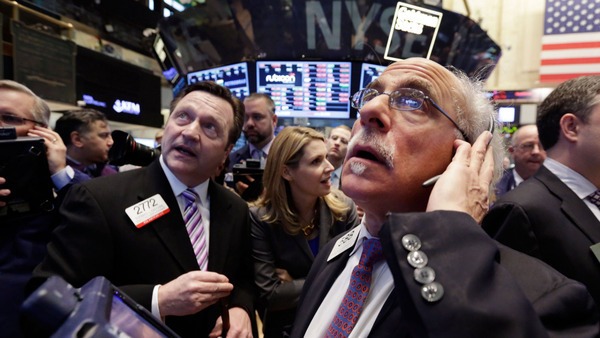On Wednesday, Google Inc (NASDAQ:GOOG)’s shares inclined 0.21% to $540.31.
Google Inc (GOOG) co-founder Sergey Brin says he sees little reason to release the accident reports involving the Internet company’s self-driving cars because he believes there’s nothing new in documents withheld to protect the privacy of other motorists.
Brin, who oversees Google’s fleet of self-driving cars, outlined his rationale Wednesday during a sometimes-testy exchange with a long-time critic at the company’s annual shareholders’ meeting in Mountain View, California.
As part of his effort to show Google has nothing to hide, Brin revealed that one of the company’s self-driving cars was rear-ended at a traffic signal during the past week. With that collision, Google’s self-driving cars have now been involved in 12 accidents while covering more than 1.7 million miles over the past six years, according to the company.
The self-driving cars have never been at fault, according to Google, though a company employee was in control at the time of one crash.
Google is planning to start testing the latest version of its self-driving car around the streets of Mountain View and other nearby public roads this summer. About 25 of the pod-like, two-seat vehicles initially will be cruising around at speeds topping out at 25 miles per hour.
Consumer Watchdog, a group that has been lambasting Google for years, is demanding that the company release the self-driving cars’ accident reports filed with the California Department of Motor Vehicles and other government agencies to give the public a better understanding of the risks posed by the vehicles. The Associated Press also has requested the records from Google and the DMV.
Google Inc., a technology company, builds products and provides services to organize the information. The company offers Google Search, which provides information online; Google Now that offers information to users when they need it; AdWords, an auction-based advertising program; AdSense, which enables Websites that are part of the Google network to deliver ads; DoubleClick Ad Exchange, a marketplace for the trading display ad space; and other advertising platforms, such as AdExchange and AdMob.
Agenus Inc (NASDAQ:AGEN)’s shares gained 4.03% to $8.27.
Agenus Inc (AGEN) declared that Merck, known as MSD outside the United States and Canada, through a partner, has extended its collaborative research term under its existing partnership and license agreement with Agenus, for the discovery and development of therapeutic antibodies to Merck proprietary immune checkpoints for the treatment of cancer.
Under the terms of the original agreement, Agenus will discover and optimize fully human antibodies against two unrevealed Merck checkpoint targets using the Retrocyte Display™ platform. Merck will be responsible for the further development and commercialization of candidates generated under the collaboration. The discovery phase has been extended to April 2016. As formerly revealed, under the terms of the agreement, Agenus is eligible to receive about $100 million in milestone payments in addition to royalties on worldwide product sales.
Agenus Inc., an immunotherapy company, engages in discovering and developing innovative treatments for patients with cancer and other diseases. Its treatments focus on providing therapeutic benefit through modulation of immune function.
At the end of Wednesday’s trade, Dunkin Brands Group Inc (NASDAQ:DNKN)‘s shares dipped -0.42% to $52.43.
Baskin-Robbins is part of the Dunkin Brands Group Inc (DNKN). Baskin-Robbins, the world’s largest chain of ice cream specialty shops, recently declared it is coming to the North County Westfield Mall in Escondido, Calif. as part of its latest expansion efforts in the San Diego area. The company has secured space in a high-traffic area in the popular Westfield Mall located at 272 E. Via Rancho Parkway. Baskin-Robbins is seeking franchise candidates who are looking for a sweet opportunity in a prime location and would like to take advantage of the many perks that Baskin-Robbins offers with this turn-key non-traditional development opportunity.
Non-traditional development opportunities, such as kiosks, have a lower development cost, shorter franchise term and less cash requirement than a traditional, standalone ice cream shop. Ideal for San Diego entrepreneurs, the North County Westfield Mall location is presently in the process of being designed and built and will comprise a 10-year franchise term and discounted royalty rates for the first three years. The asking price for the new Baskin-Robbins kiosk is $100,000 and is projected to open prior to the busy holiday season this year.
On the heels of the Westfield Mall opportunity, this summer, Baskin-Robbins will start developing one to two other shops in the San Diego market for which franchisees can assume ownership. These sites present unique opportunities to own and operate locations that are delivered as a ready to operate shops.
Dunkin Brands Group, Inc., together with its auxiliaries, develops, franchises, and licenses quick service restaurants under the Dunkin Donuts and Baskin-Robbins brands worldwide.
DISCLAIMER:
This article is published by www.wsnewspublishers.com. The Content included in this article is just for informational purposes only. All information used in this article is believed to be from reliable sources, but we make no representations or warranties of any kind, express or implied, about the completeness, accuracy, or reliability with respect to this article.
All visitors are advised to conduct their own independent research into individual stocks before making a purchase decision.
Information contained in this article contains forward-looking information within the meaning of Section 27A of the Securities Act of 1933 and Section 21E of the Securities Exchange Act of 1934, counting statements regarding the predictable continual growth of the market for the corporation’s products, the corporation’s ability to fund its capital requirement in the near term and in the long term; pricing pressures; etc.
Any statements that express or involve discussions with respect to predictions, expectations, beliefs, plans, projections, objectives, aims, assumptions, or future events or performance may be forward looking statements. Forward-looking statements are based on expectations, estimates, and projections at the time the statements are made that involve a number of risks and uncertainties which could cause actual results or events to differ materially from those presently anticipated. Forward looking statements may be identified through the use of such words as expects, will, anticipates, estimates, believes, or by statements indicating certain actions may, could, should might occur.



